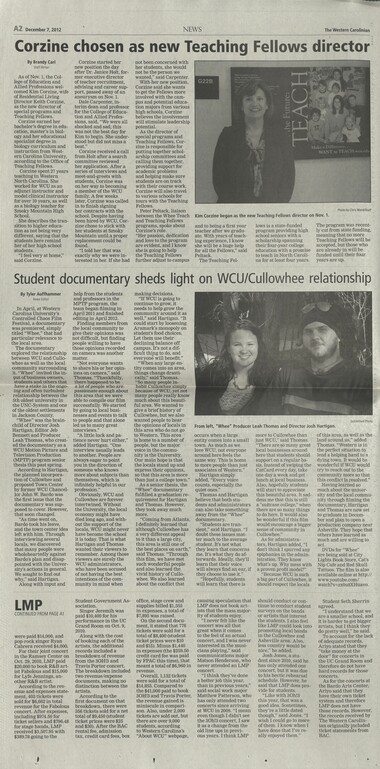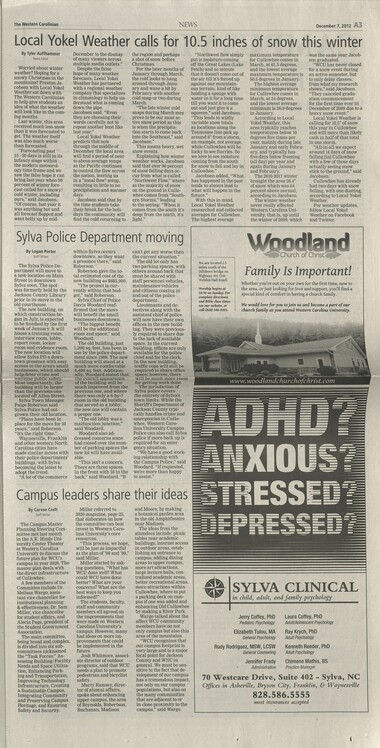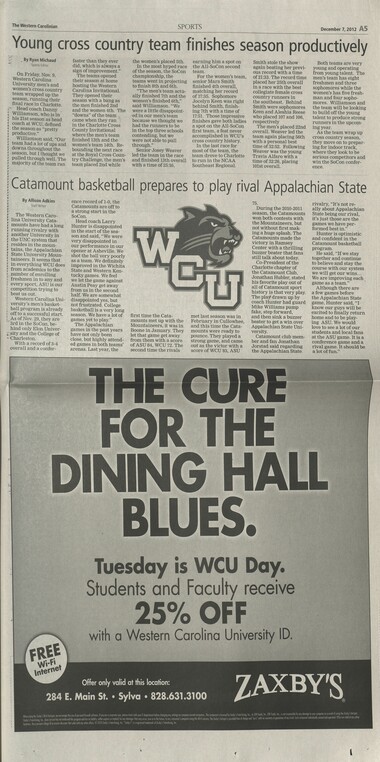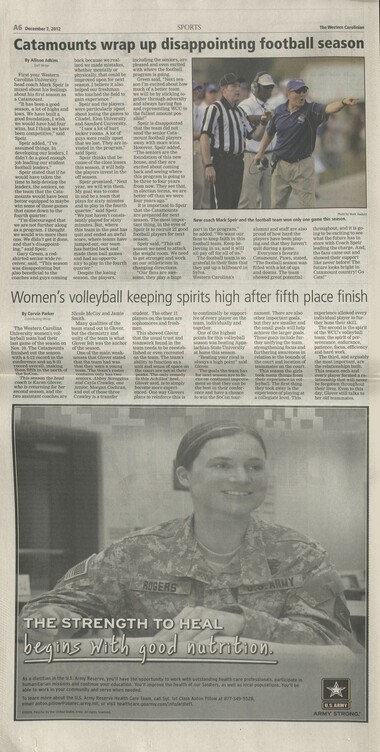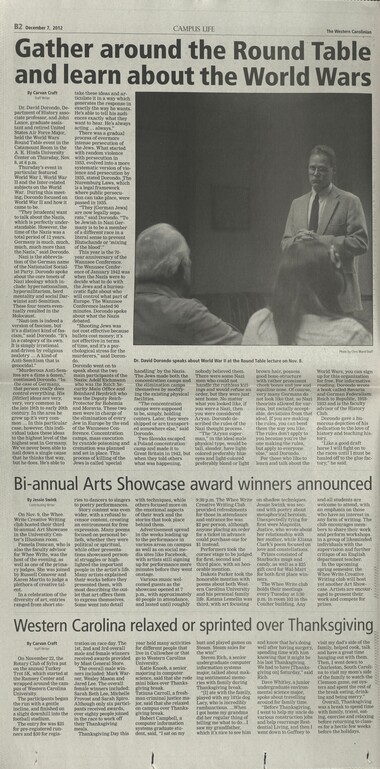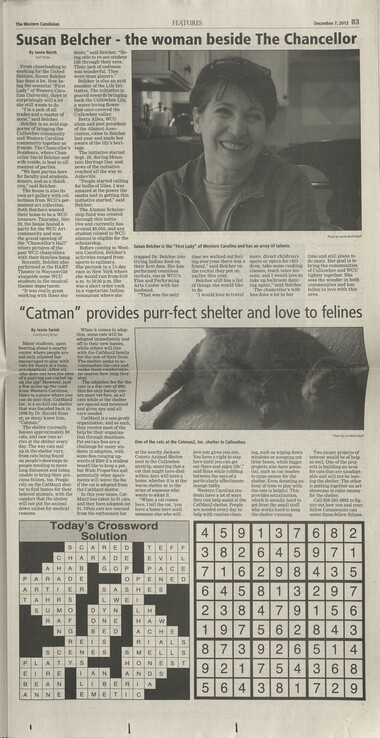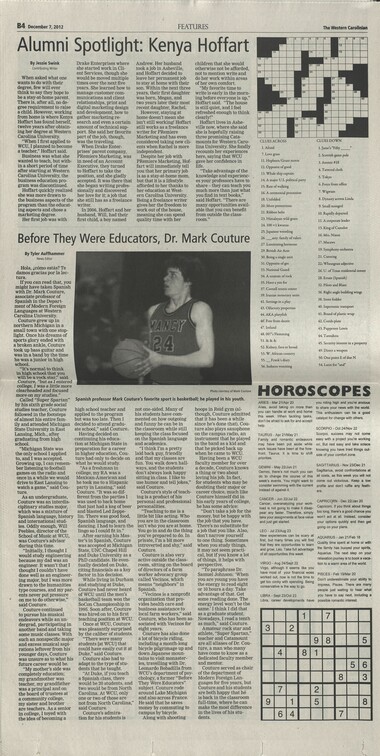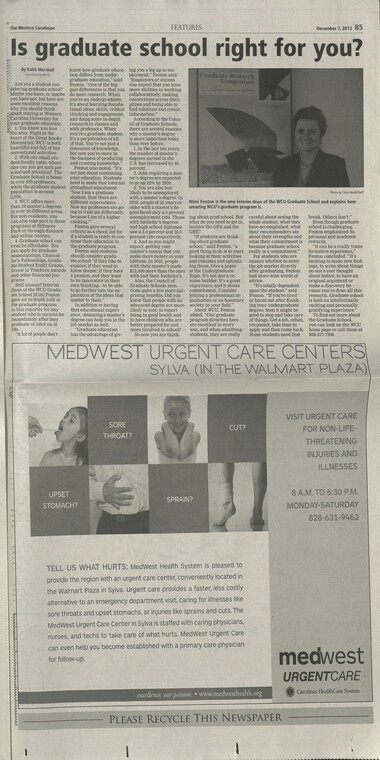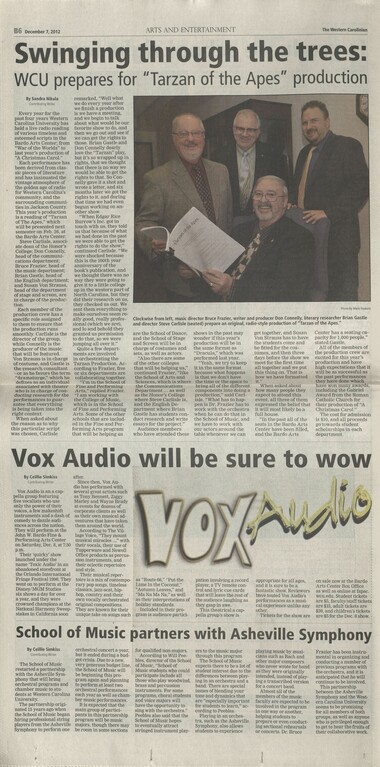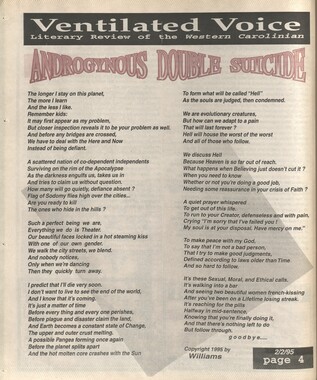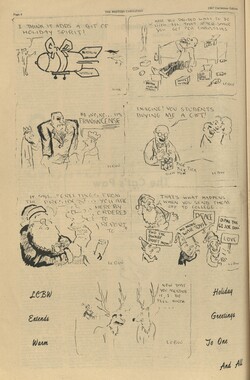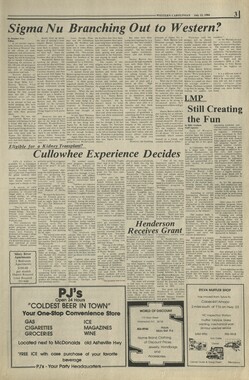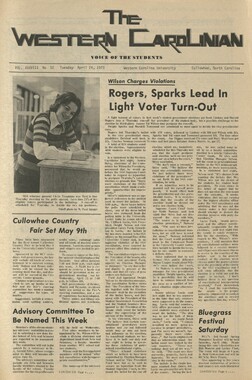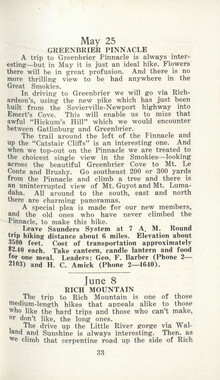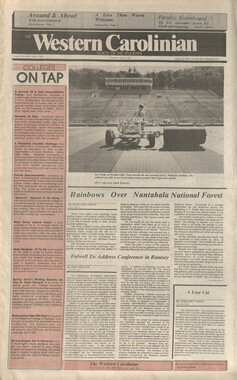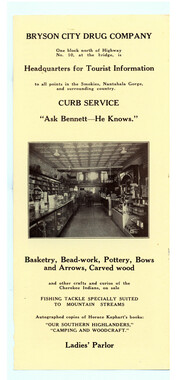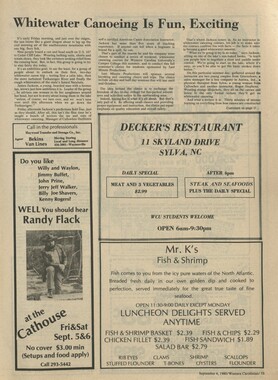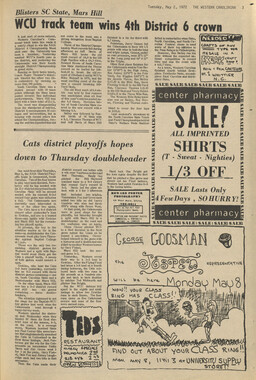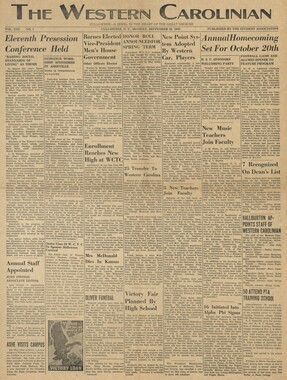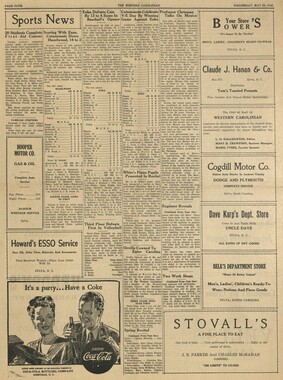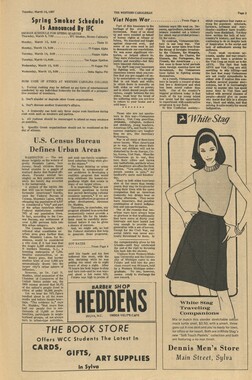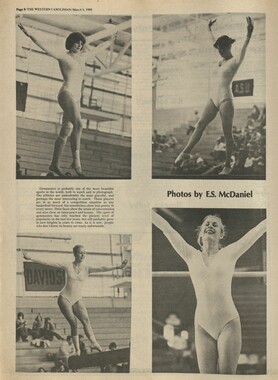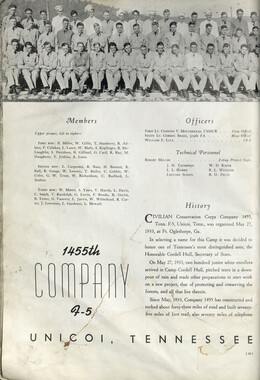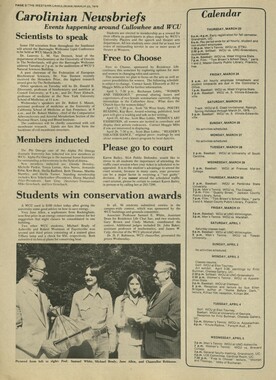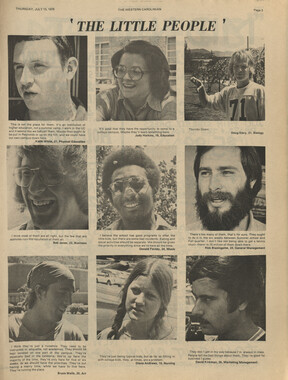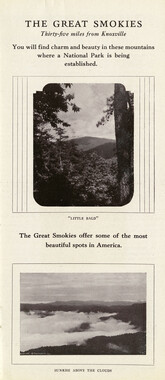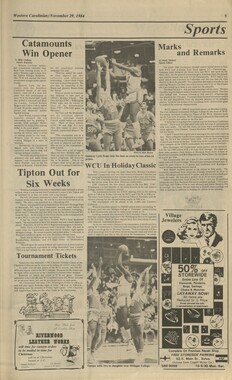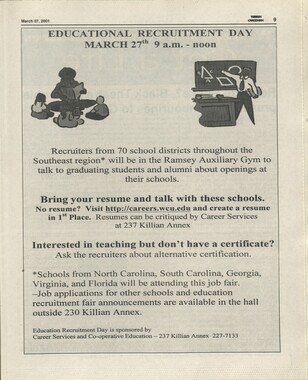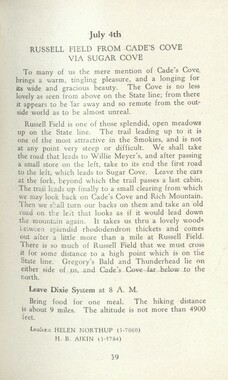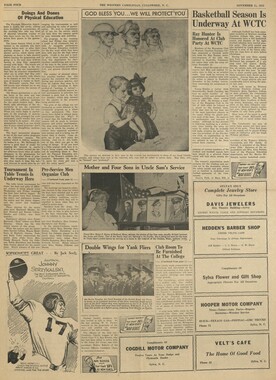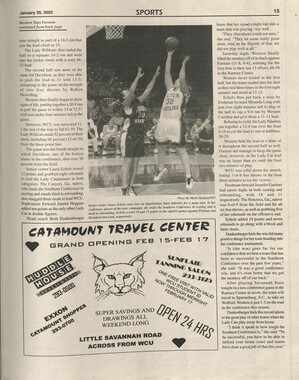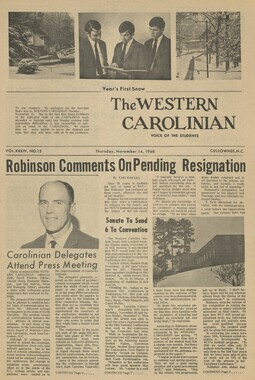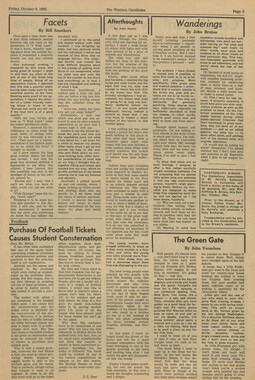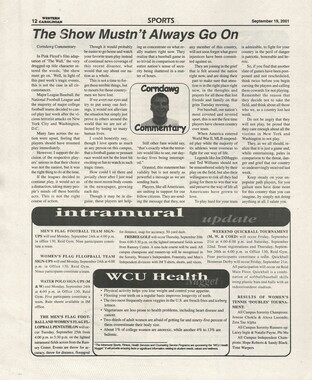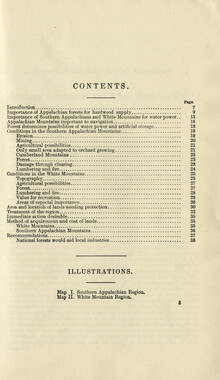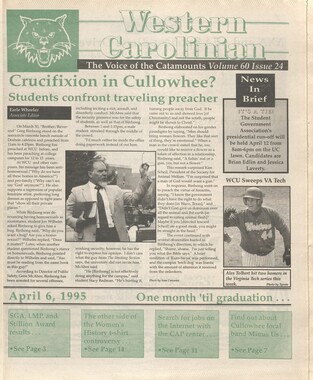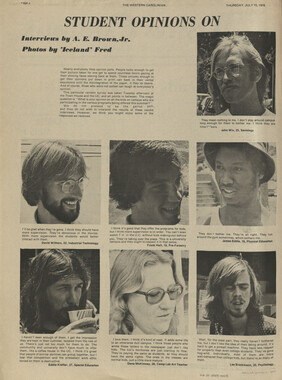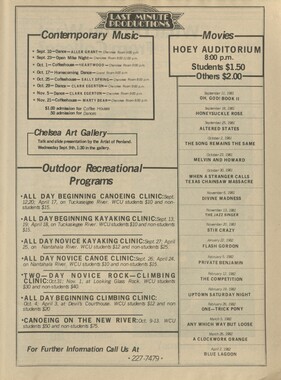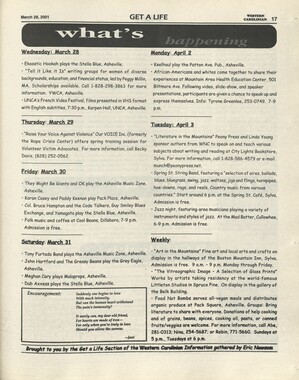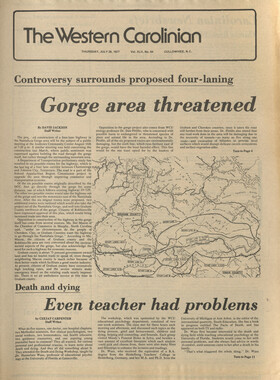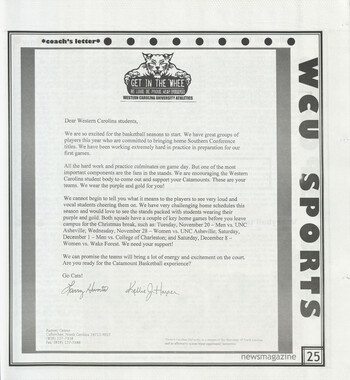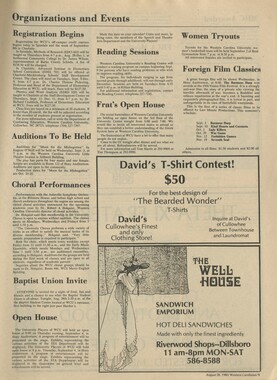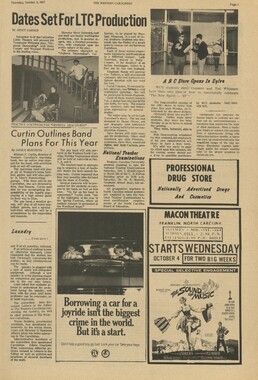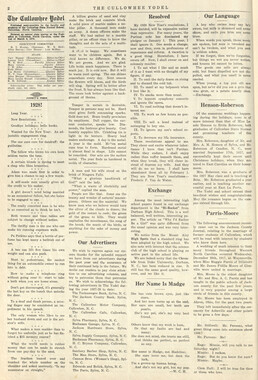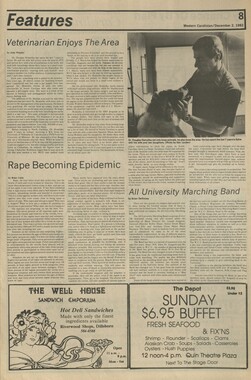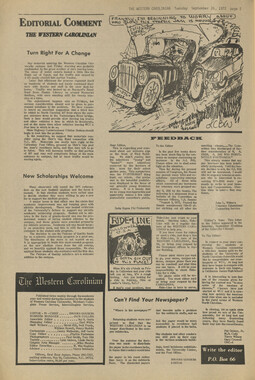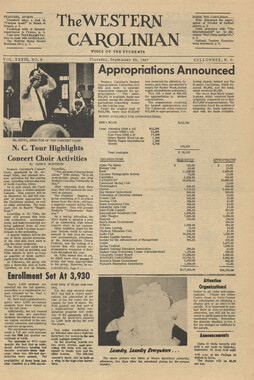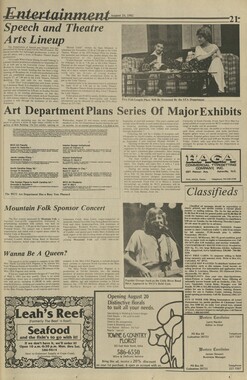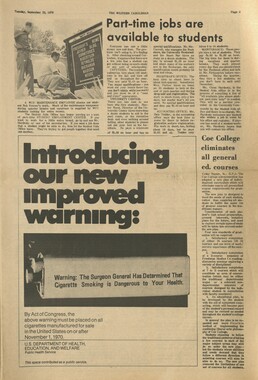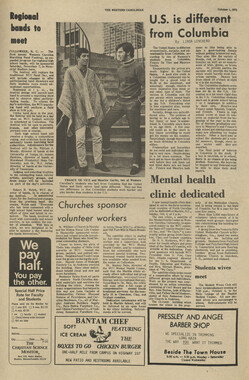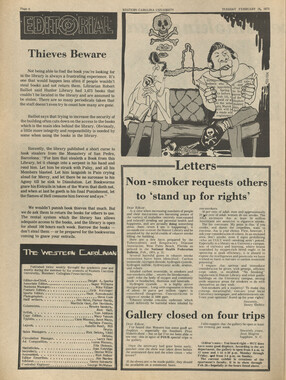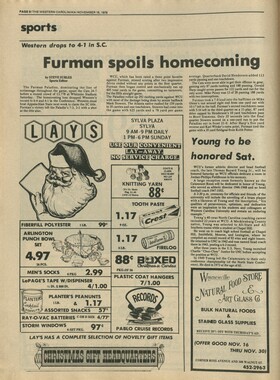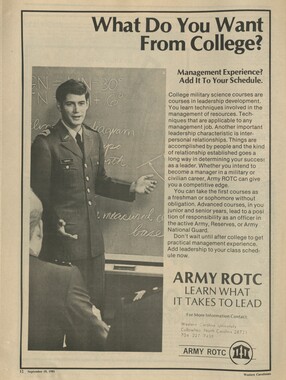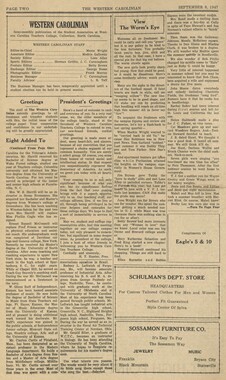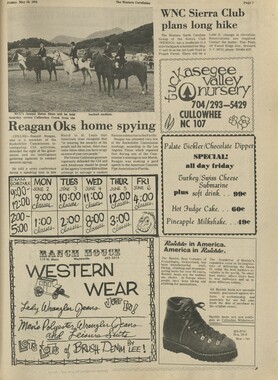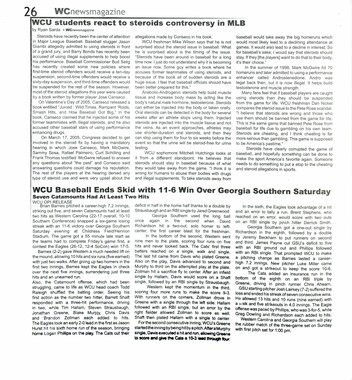Western Carolina University (21)
View all
- Canton Champion Fibre Company (2308)
- Cherokee Traditions (291)
- Civil War in Southern Appalachia (165)
- Craft Revival (1942)
- George Masa Collection (137)
- Great Smoky Mountains - A Park for America (2900)
- Highlights from Western Carolina University (422)
- Horace Kephart (973)
- Journeys Through Jackson (159)
- LGBTQIA+ Archive of Jackson County (85)
- Oral Histories of Western North Carolina (316)
- Picturing Appalachia (6797)
- Stories of Mountain Folk (413)
- Travel Western North Carolina (153)
- Western Carolina University Fine Art Museum Vitreograph Collection (129)
- Western Carolina University Herbarium (92)
- Western Carolina University: Making Memories (738)
- Western Carolina University Publications (2491)
- Western Carolina University Restricted Electronic Theses and Dissertations (146)
- Western North Carolina Regional Maps (71)
- World War II in Southern Appalachia (131)
University of North Carolina Asheville (6)
View all
- Allanstand Cottage Industries (62)
- Appalachian National Park Association (53)
- Bennett, Kelly, 1890-1974 (1463)
- Berry, Walter (76)
- Brasstown Carvers (40)
- Carver, George Washington, 1864?-1943 (26)
- Cathey, Joseph, 1803-1874 (1)
- Champion Fibre Company (233)
- Champion Paper and Fibre Company (297)
- Cherokee Indian Fair Association (16)
- Cherokee Language Program (22)
- Crowe, Amanda (40)
- Edmonston, Thomas Benton, 1842-1907 (7)
- Ensley, A. L. (Abraham Lincoln), 1865-1948 (275)
- Fromer, Irving Rhodes, 1913-1994 (70)
- George Butz (BFS 1907) (46)
- Goodrich, Frances Louisa (120)
- Grant, George Alexander, 1891-1964 (96)
- Heard, Marian Gladys (60)
- Kephart, Calvin, 1883-1969 (15)
- Kephart, Horace, 1862-1931 (313)
- Kephart, Laura, 1862-1954 (67)
- Laney, Gideon Thomas, 1889-1976 (439)
- Masa, George, 1881-1933 (61)
- McElhinney, William Julian, 1896-1953 (44)
- Niggli, Josephina, 1910-1983 (10)
- North Carolina Park Commission (105)
- Osborne, Kezia Stradley (9)
- Owens, Samuel Robert, 1918-1995 (11)
- Penland Weavers and Potters (36)
- Roberts, Vivienne (15)
- Roth, Albert, 1890-1974 (142)
- Schenck, Carl Alwin, 1868-1955 (1)
- Sherrill's Photography Studio (2565)
- Southern Highland Handicraft Guild (127)
- Southern Highlanders, Inc. (71)
- Stalcup, Jesse Bryson (46)
- Stearns, I. K. (213)
- Thompson, James Edward, 1880-1976 (226)
- United States. Indian Arts and Crafts Board (130)
- USFS (683)
- Vance, Zebulon Baird, 1830-1894 (1)
- Weaver, Zebulon, 1872-1948 (58)
- Western Carolina College (230)
- Western Carolina Teachers College (282)
- Western Carolina University (2008)
- Western Carolina University. Mountain Heritage Center (18)
- Whitman, Walt, 1819-1892 (10)
- Wilburn, Hiram Coleman, 1880-1967 (73)
- Williams, Isadora (3)
- Cain, Doreyl Ammons (0)
- Crittenden, Lorraine (0)
- Rhodes, Judy (0)
- Smith, Edward Clark (0)
- Appalachian Region, Southern (2940)
- Asheville (N.C.) (1944)
- Avery County (N.C.) (26)
- Blount County (Tenn.) (195)
- Buncombe County (N.C.) (1680)
- Cherokee County (N.C.) (283)
- Clay County (N.C.) (556)
- Graham County (N.C.) (238)
- Great Smoky Mountains National Park (N.C. and Tenn.) (525)
- Haywood County (N.C.) (3573)
- Henderson County (N.C.) (70)
- Jackson County (N.C.) (4919)
- Knox County (Tenn.) (35)
- Knoxville (Tenn.) (13)
- Lake Santeetlah (N.C.) (10)
- Macon County (N.C.) (421)
- Madison County (N.C.) (216)
- McDowell County (N.C.) (39)
- Mitchell County (N.C.) (135)
- Polk County (N.C.) (35)
- Qualla Boundary (982)
- Rutherford County (N.C.) (78)
- Swain County (N.C.) (2185)
- Transylvania County (N.C.) (270)
- Watauga County (N.C.) (12)
- Waynesville (N.C.) (86)
- Yancey County (N.C.) (72)
- Aerial Photographs (3)
- Aerial Views (60)
- Albums (books) (4)
- Articles (1)
- Artifacts (object Genre) (228)
- Bibliographies (1)
- Biography (general Genre) (2)
- Cards (information Artifacts) (38)
- Clippings (information Artifacts) (192)
- Copybooks (instructional Materials) (3)
- Crafts (art Genres) (622)
- Depictions (visual Works) (21)
- Design Drawings (1)
- Digital Moving Image Formats (2)
- Drawings (visual Works) (185)
- Envelopes (101)
- Exhibitions (events) (1)
- Facsimiles (reproductions) (1)
- Fiction (general Genre) (4)
- Financial Records (12)
- Fliers (printed Matter) (67)
- Glass Plate Negatives (381)
- Guidebooks (2)
- Internegatives (10)
- Interviews (817)
- Land Surveys (102)
- Letters (correspondence) (1045)
- Manuscripts (documents) (618)
- Maps (documents) (177)
- Memorandums (25)
- Minutes (administrative Records) (59)
- Negatives (photographs) (6090)
- Newsletters (1290)
- Newspapers (2)
- Notebooks (8)
- Occupation Currency (1)
- Paintings (visual Works) (1)
- Pen And Ink Drawings (1)
- Periodicals (193)
- Personal Narratives (10)
- Photographs (12976)
- Plans (maps) (1)
- Poetry (6)
- Portraits (4568)
- Postcards (329)
- Programs (documents) (181)
- Publications (documents) (2444)
- Questionnaires (65)
- Relief Prints (26)
- Sayings (literary Genre) (1)
- Scrapbooks (282)
- Sheet Music (2)
- Slides (photographs) (402)
- Songs (musical Compositions) (2)
- Sound Recordings (796)
- Specimens (92)
- Speeches (documents) (18)
- Tintypes (photographs) (8)
- Transcripts (324)
- Text Messages (0)
- A.L. Ensley Collection (275)
- Appalachian Industrial School Records (7)
- Appalachian National Park Association Records (336)
- Axley-Meroney Collection (2)
- Bayard Wootten Photograph Collection (20)
- Bethel Rural Community Organization Collection (7)
- Blumer Collection (5)
- C.W. Slagle Collection (20)
- Canton Area Historical Museum (2110)
- Carlos C. Campbell Collection (462)
- Cataloochee History Project (64)
- Cherokee Studies Collection (4)
- Daisy Dame Photograph Album (5)
- Daniel Boone VI Collection (1)
- Doris Ulmann Photograph Collection (112)
- Elizabeth H. Lasley Collection (1)
- Elizabeth Woolworth Szold Fleharty Collection (4)
- Frank Fry Collection (95)
- George Masa Collection (173)
- Gideon Laney Collection (452)
- Hazel Scarborough Collection (2)
- Hiram C. Wilburn Papers (28)
- Historic Photographs Collection (236)
- Horace Kephart Collection (861)
- Humbard Collection (33)
- Hunter and Weaver Families Collection (1)
- I. D. Blumenthal Collection (4)
- Isadora Williams Collection (4)
- Jesse Bryson Stalcup Collection (47)
- Jim Thompson Collection (224)
- John B. Battle Collection (7)
- John C. Campbell Folk School Records (80)
- John Parris Collection (6)
- Judaculla Rock project (2)
- Kelly Bennett Collection (1482)
- Love Family Papers (11)
- Major Wiley Parris Civil War Letters (3)
- Map Collection (12)
- McFee-Misemer Civil War Letters (34)
- Mountain Heritage Center Collection (4)
- Norburn - Robertson - Thomson Families Collection (44)
- Pauline Hood Collection (7)
- Pre-Guild Collection (2)
- Qualla Arts and Crafts Mutual Collection (12)
- R.A. Romanes Collection (681)
- Rosser H. Taylor Collection (1)
- Samuel Robert Owens Collection (94)
- Sara Madison Collection (144)
- Sherrill Studio Photo Collection (2558)
- Smoky Mountains Hiking Club Collection (616)
- Stories of Mountain Folk - Radio Programs (374)
- The Reporter, Western Carolina University (510)
- Venoy and Elizabeth Reed Collection (16)
- WCU Gender and Sexuality Oral History Project (32)
- WCU Mountain Heritage Center Oral Histories (25)
- WCU Oral History Collection - Mountain People, Mountain Lives (71)
- WCU Students Newspapers Collection (1923)
- Western North Carolina Tomorrow Black Oral History Project (69)
- William Williams Stringfield Collection (2)
- Zebulon Weaver Collection (109)
- African Americans (390)
- Appalachian Trail (35)
- Artisans (521)
- Cherokee art (84)
- Cherokee artists -- North Carolina (10)
- Cherokee language (21)
- Cherokee pottery (101)
- Cherokee women (208)
- Church buildings (190)
- Civilian Conservation Corps (U.S.) (111)
- College student newspapers and periodicals (2012)
- Dams (108)
- Dance (1023)
- Education (222)
- Floods (63)
- Folk music (1015)
- Forced removal, 1813-1903 (2)
- Forest conservation (220)
- Forests and forestry (1197)
- Gender nonconformity (4)
- Great Smoky Mountains National Park (N.C. and Tenn.) (181)
- Hunting (46)
- Landscape photography (25)
- Logging (119)
- Maps (83)
- Mines and mineral resources (9)
- North Carolina -- Maps (18)
- Paper industry (38)
- Postcards (255)
- Pottery (135)
- Railroad trains (72)
- Rural electrification -- North Carolina, Western (3)
- School integration -- Southern States (2)
- Segregation -- North Carolina, Western (5)
- Slavery (5)
- Sports (452)
- Storytelling (243)
- Waterfalls -- Great Smoky Mountains (N.C. and Tenn.) (66)
- Weaving -- Appalachian Region, Southern (280)
- Wood-carving -- Appalachian Region, Southern (328)
- World War, 1939-1945 (173)
Western Carolinian Volume 78 Number 12
Item
Item’s are ‘child’ level descriptions to ‘parent’ objects, (e.g. one page of a whole book).
-
-
\2 December 7, 2012 NEWS The Western Carolinian - Corzine chosen as new Teaching Fellows director By Brandy Carl Staff Writer As of Nov. 1, the Col- lege of Education and Allied Professions wel- comed Kim Corzine, wife of Residential Living Director Keith Corzine, as the new director of special programs and Teaching Fellows. Corzine earned her bachelors degree in edu- cation, masters in biol- ogy and her educational specialist degree in biology curriculum and instruction from West- ern Carolina University, according to the Office of Teaching Fellows. Corzine spent 27 years teaching in Western North Carolina. She worked for WCU as an adjunct instructor and model clinical instructor for over 10years, as well as a biology teacher for Smoky Mountain High School. She describes the tran- sition to higher educa- tion as not being very different, saying that the students here remind her of her high school students. T feel very at home, said Corzine. Corzine started her new position the day after Dr. Janice Holt, for- mer executive director of teacher recruitment, advising and career sup- port, passed away of an aneurysm on Nov. 1. Dale Carpenter, in- terim dean and professor for the College of Educa- tion and Allied Profes- sions, said, We were all shocked and sad; this was not the best day for Kim to begin. She under- stood but did not missa beat. Corzine received a call from Holt after a search committee reviewed her application. After a series of interviews and meet-and-greets with students, Corzine was on her way to becoming a member of the WCU family. A few weeks later, Corzine was called in to finish signing her contracts with the school. Despite having been hired by WCU, Cor- zine chose to stick with her students at Smoky Mountain until a proper replacement could be found. IT told her that was exactly why we were in- terested in her. If she had not been concerned with her students, she would not be the person we wanted, said Carpenter. With her new position, Corzine said she wants to get the Fellows more involved with the cam- pus and potential educa- tion majors from various high schools. Corzine believes the involvement will stimulate leadership potential. As the director of special programs and Teaching Fellows, Cor- zine is responsible for putting together schol- arship committees and calling them together, providing support for academic problems and helping make sure students are on track with their course work. Corzine will also travel to various schools for tours with the Teaching Fellows. Peter Peltack, liaison between the Whee Teach and Teaching Fellows programs, spoke about Corzines role. | Her passion, dedication and love to the program are evident, and I know she is going to help - the Teaching Fellows further adjust to campus Photo by Chris Ward/Staff Kim Corzine began as the new Teaching Fellows director on Nov. 1. and to being a first year teacher after we gradu- ate. With years of teach- ing experience, I know she will be a huge help for all the Fellows, said Peltack. The Teaching Fel- lows is a state-funded program providing high .school seniors with a scholarship spanning -their four-year college education with a promise to teach in North Caroli- na for at least four years. The program was recent- ly cut from state funding, meaning that no more Teaching Fellows will be accepted, but those who are already in will be funded until their four years are up. Student documentary By Tyler Auffhammer News Editor In April, at Western Carolina Universitys Controlled Chaos Film Festival, a documentary ' was premiered, simply titled Whee, that had particular relevance to the local area. The documentary explored the relationship _ between WCU and Cullo- whee as well as the local community surrounding it. Whee invited the in- put of business owners, - students and others that have a stake in the ongo- ing and often turbulent relationship between the 5th oldest university in the UNC-System and one of the oldest settlements in Jackson County. Whee was the brain- child of Director Josh Hartigan, Editor Jeb Bennett and Producer Leah Thomas, who creat- ed the documentary as a WCU Motion Picture and Television Production (MPTP) program senior _ thesis this past spring. According to Hartigan, the planned incorpora- tion of Cullowhee and proposed Town Center by former WCU Chancel- lor John W. Bardo was _ the first issue that the documentary was sup- posed to cover. However, that soon changed. As time went on, Bardo took his leave, and the town center idea left with him. Through interviewing several locals, we discovered that many people were wholeheartedly against Bardo's plan and disap- pointed with the Univer- sity's actions in general. We sought to find out why, said Hartigan. Along with input and help from the students and professors in the MPTP program, the team began filming in April 2011 and finished editing in April 2012. Finding members from the local community to give their opinions was not difficult, but finding people willing to have those opinions recorded on camera was another matter. Not everyone wants to share his or her opin- ions on camera, said Thomas. Thankfully, there happened to be a lot of people who are passionate enough about this area that we were able to compile our film successfully. We started by going to local busi- nesses and events to talk to people and that alone led us to many great interviews. A little luck and pa- tience never hurt either, added Hartigan. One interview usually leads to another. People are always eager to point you in the direction of someone who knows more about subjects than themselves, which is infinitely helpful in our profession. Obviously, WCU and Cullowhee are forever intertwined. Without the University, the local economy might have died long ago, and with- out the support of the locals, WCU might never have become the school it is today. That is what Hartigan and Thomas wanted their viewers to _ remember. Among those viewers are surely the WCU administrators, who have been accused of not having the best intentions of the com- munity in mind when making decisions. _ Tf WCU is going to continue to grow, it needs to help grow the community around it as well, said Hartigan. It could start by loosening Aramark's monopoly on student's food choices. Let them use their declining balance off campus. It's not a dif- ficult thing to do, and everyone will benefit. oh When any large en- tity comes into an area, things change drasti- ~ Cally, said Thomas. So many people in- habit Cullowhee simply because of WCU, yet not many people really know much about this beauti- ful area. We wanted to give a brief history of Cullowhee, but we also wanted people to hear the opinions of locals in this area who do not go to Western. This area is home to a number of people, but the major voice in the commu- nity is the University. Our main hope is that the locals stand up and express their opinions, so that this area is more than just a college town. As a senior thesis, the Whee documentary fulfilled a graduation re- quirement for Hartigan and Thomas. However, they took away much more. Coming from Atlanta, I definitely learned that although Cullowhee has avery different appeal to it than a large city, this area is still one of the best places on earth, said Thomas. Through this film, we have met such wonderful people and also learned the vivid history of Cullo- whee. We also learned about the conflict that From left, Whee Producer Leah Thomas and Director Josh Hartigan. occurs when a large entity comes into a small town. As much as we love WCU, not everyone around here feels the same way. This is home to more people than Just associates of Western. Hartigan simply added, Every voice counts, especially the - quiet ones. - Thomas and Hartigan believe that both stu- dents and administrators can also take something away from the Whee documentary. Students are tran- sient, said Hartigan. I doubt these issues mat- ter much to the average student. It's not what they learn that concerns me. It's what they do af- terwards. Ideally, they'll learn that their voice will always find an ear, if they choose to use it. Hopefully, students will learn that there is more to Cullowhee than just WCU, said Thomas. There are so many great local businesses around here that students should support on a regular ba- sis. Instead of swiping the CatCard every day, take one day a week and get lunch at local business. Also, hopefully students will start to appreciate this beautiful area. It sad- dens me that this is still a "suitcase college," when there are so many things to do here. It would also be wonderful if this film would encourage a bigger sense of community in Cullowhee. As for administra- tors, Hartigan added, I don't think I spurred any epiphanies in the admin- istration. They know what's up. Why mess with a proven profit model? Because WCU is such a big part of Cullowhee, it should respect the locals LMP CONTINUED FROM PAGE A1 were paid $14,000, and pop-rock singer Ryan Cabrera received $4,000. For their joint concert in the Ramsey Center on Oct. 29, 2010, LMP paid $20,000 to book R&B art- ist Fabolous and $15,000 for Lyfe Jennings, an- other R&B artist. According to the rev- enue and expenses state- ment, 403 tickets were sold for $6,662 in total revenue for the Fabolous concert. After expenses, including $974.50 for ticket sellers and $796.48 for stage hands, LMP received $3,507.95 with $389.78 going to the Student Government As- sociation. Singer Jeremih was paid $10,400 for his performance in the UC Grand Room on Oct. 9, 2010. Along with the cost of booking each of the artists, the additional records included a breakdown of revenue from the 30H!3 and Travis Porter concert. The breakdown included two revenue/expense documents, making no distinction between the artists. According to the first document on that breakdown, there were 356 tickets sold for a net total of $9,450 (student ticket prices were $25 and $30). After the BAC rental fee, admission tax, credit card fees, box office, stage crew and supplies billed $1,555 in expenses, a total of $7,895 was raised. On the second docu- ment, it stated that 776 tickets were sold for a total of $8,400 (student ticket prices were $10 and $15). Minus $1,440 in expenses (the $259.50 credit card fee was paid by FPAC this time), that meant a total of $6,960 in revenue. | Overall, 1,132 tickets were sold for a total of $14,855. Compared to the $41,000 paid to book 380H!3 and Travis Porter, the revenue gained is miniscule in compari- son. Also, under 2,000 tickets are sold out, but there are over 9,000 students, according to Western Carolinas About WCU webpage, causing speculation that LMP does not book art- ists that the mass major- ity of students enjoy. T never felt like the concert was all that great when it comes to the feel of an actual concert, and I was never interested in the musi- cians playing, said communications major Matson Henderson, who never attended an LMP concert. T think they've done a better job this year, than in previous years, said social work major Matthew Patterson, who has only attended two concerts since arriving at WCU in 2009. I mean even though I didn't see the 30h!3 concert, I saw it as a change from the old line ups in previ- ous years. I think LMP should conduct or con- tinue to conduct student surveys on the bands or artists that interest the students. I also feel like LMP could look into promoting local bands in the Cullowhee and Asheville area. Also, less country would be nice, he added. Josh Jones, a stu- dent since 2010, said he has only attended one concert, but it was due to his hectic rehearsal schedule. However, he said that LMP does pro- vide for students. Like with 30h!3 this year, that wasa good idea. Sometimes, theyre a little dated though, said Jones. I wish I could go to more of them. I know when I have done that Ive re- ally enjoyed them. Submitted Photo of this area, as well as the ... land around us, added Thomas. Western is in the perfect situation to lend a helping hand toa dying town. It would be } wonderful if WCU would . try to reach out to the community more so that this conflict is resolved. . - Having learned so much about the univer- sity and the local commu- nity through filming the documentary, Hartigan and Thomas are now set to graduate in Decem- - ber and plan to open a production company near Asheville. They hope that others have learned as much and are willing to act. DVDs for Whee are being sold at City Lights Book Store, Cat's Nip Cafe and Red Skull Tattoos. The film is also available online at http:// www.youtube.com/ watch?v=zx0u8x Huavo. Student Seth Sherrin agreed. T understand that we are a smaller school, and it is harder to get bigger artists, but I think they do pretty well, hesaid. | To account for the lack of adequate records, Ariyo stated that they take money at the door for concerts in the UC Grand Room and therefore do not have hard records for those concerts. As for the concerts at the Bardo Arts Center, Ariyo said that they - have their own ticket system and therefore LMP does not have those records. However; the records received by The Western Carolin- ian originally included ticket statements from BAC.
Object
Object’s are ‘parent’ level descriptions to ‘children’ items, (e.g. a book with pages).
-
The Western Carolinian is Western Carolina University's student-run newspaper. The paper was published as the Cullowhee Yodel from 1924 to 1931 before changing its name to The Western Carolinian in 1933.
-
